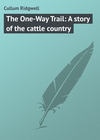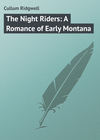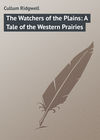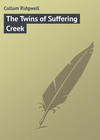Czytaj książkę: «The Golden Woman: A Story of the Montana Hills», strona 22
CHAPTER XXXV
FROM OUT OF THE ABYSS
Joan swayed where she stood. She stumbled and fell; and the fall went on, and on, and on. It seemed to her that she was rushing down through endless space toward terrors beyond all believing. It seemed to her that a terrific wind was beating on her, and driving her downward toward a fiercely storm-swept ocean, whose black, hideous waves were ever reaching up to engulf her.
She cried out. She knew she cried out, and she knew she cried out in vain. Some one, it seemed to her, was far, far up above her, watching, seeking to aid her, but powerless to respond to her heart-broken cries. Still she called, and she knew she must go on calling, till the dark seas below drowned the voice in her throat.
Now shadows arose about her, mocking, cruel shadows. They were definite figures, but she could not give them definite form in her mind. She reached out toward them, clutching vainly at fluttering shapes, but ever missing them in her headlong career. She sped on, buffeted and hurtling, and torn; on, on, making that hideous journey through space.
Her despairing thoughts flashed at lightning speed through her whirling brain. Faster they came, faster and faster, till she had no time to recognize, no power to hold them. She could see them, yes, she could literally see them sweep by, vanishing like shadows in that black space of terror.
Then came a sudden accession of sharp stabbing pain. It seemed to tick through her body as might a clock, and each stab came as with the sway of the pendulum, and with a regularity that was exquisite torture. The stabs of pain came quicker, the pendulum was working faster. Faster and faster it swung, and so the torture was ever increasing. Now the pain was in her head, her eyes, her ears, her brain. The agony was excruciating. Her head was bursting. She cried louder and louder, and, with every cry, the pain increased until she felt she was going mad. Then suddenly the pendulum stopped swinging and her cries and her agony ceased, and all was still, silent and dark.
It might have been a moment, or it might have been ages. Suddenly this wonderful peace was disturbed. It was as though she had just awakened from a deep refreshing sleep in some strange, unfamiliar world. The darkness remained, but it was the darkness of peace. The beating wind had gone, and she only heard it sighing afar off. She was calling again, but no longer in despair. She was calling to that some one far above her with the certain knowledge that she would be answered. The darkness was passing, too. Yes, and she was no longer falling, but soaring up, up, winging her way above, without effort, without pain.
The savage waves were receding, their voices had died to a low murmur, like the voice of a still, summer sea on a low foreshore. Now, too, between every cry she waited for that answer which she knew must be forthcoming. It was some man’s voice she was awaiting, some man, whose name ever eluded her searching brain. She strained to hear till the pulses of her ear-drums throbbed, for she knew when she heard the voice she would recognize the speaker.
Hark, there it was, far, far away. Yes, she could hear it, but how far she must have fallen. There it was again. It was louder, and – nearer. Again and again it came. It was quite plain. It was a voice that set her brain and heart afire with longing. It was a voice she loved more than all the world. Hark! What was that it said? Yes, there it was again.
“Pore little gal, pore little Joan.”
Now she knew, and a flood of thankfulness welled up in her heart. A great love thrilled through her veins, and tears flooded her eyes, tears of thankfulness and joy. Tears for herself, for him, for all the world. It was Buck’s voice full of pity and a tender love.
In a moment she was awake. She knew she was awake to a sort of dazed consciousness, because instantly her brain was flooded with all the horror of memory. Memory of the storm, the fire, of the devastation of her home.
For long minutes she had no understanding of anything else. She was consumed by the tortures of that memory. Yes, it was still storming, she could hear the howling of the wind, the roar of thunder, and the hiss and crackling of fire. Where was she? Ah, she knew. She was outside, with the fire before and behind her. And her aunt was at her side. She reached out a hand to reassure herself, and touched something soft and warm. But what was that? Surely it was Buck’s voice again?
“Thank God, little gal, I tho’t you was sure dead.”
In desperate haste she struggled to rise to her feet, but everything seemed to rock and sway under her. And then, as Buck spoke again, she abandoned her efforts.
“Quiet, little gal, lie you still, or I can’t hold you. You’re dead safe fer the moment. I’ve got you. We’re tryin’ to git out o’ this hell, Cæsar an’ me. An’ Cæsar’s sure doin’ his best. Don’t you worrit. The Padre’s behind, an’ he’s got your auntie safe.”
Joan’s mind had suddenly become quite clear. There was no longer any doubt in it. Now she understood where she was. Buck had come to save her. She was in his arms, on Cæsar’s back – and she knew she would be saved.
With an effort she opened her eyes and found herself looking into the dark face of the man she loved, and a great sigh of contentment escaped her. She closed them again, but it was only to open them almost immediately. Again she remembered, and looked about her.
Everywhere was the lurid glow of fire, and she became aware of intense heat. Above her head was the roar of tempest, and the vivid, hellish light of the storm. Buck had called it “hell.”
“The whole world seems to be afire,” she said suddenly.
Buck looked down into her pale face.
“Well nigh,” he said. Then he added, “Yes, it’s afire, sure. It’s afire that bad the Almighty alone guesses if we’ll git out.”
But his doubt inspired no apprehension. Somehow Joan’s confidence was the effect of his strong supporting arm.
She stirred again in his arms. But it was very gently.
“Buck,” she said, “let me sit up. It will ease you – and help poor Cæsar. I’m – I’m not afraid now.”
Buck gave a deep-throated laugh. He felt he wanted to laugh, now he was sure that Joan was alive.
“You don’t need. Say, you don’t weigh nuthin’. An’ Cæsar, why, Cæsar’s mighty proud I’m lettin’ him carry you.”
But the girl had her way, and, in a moment, was sitting up with one arm about the man’s broad shoulders. It brought her face near to his, and Buck bent his head toward her, and kissed the wonderful ripe lips so temptingly adjacent.
For a moment Joan abandoned herself to the joy of that kiss. Then the rhythmic sway of Cæsar’s body under her reminded her that there were other things. She wanted to ask Buck how they had known and come to her help. She wanted to ask a dozen woman’s questions. But she refrained. Buck had spoken of “hell,” and she gazed about her seeking the reason of his doubt.
In a few minutes she was aware of it all. In a few minutes she realized that he had well named the country through which they were riding. In a few minutes she knew that it was a race for life, and that their hope was in the great heart of Cæsar.
Far as the eye could see in that ruddy light, tortured and distorted by the flashes of storm above, was an ocean of fire spread out. The crowning billows of smoke, like titanic foam-crests, rolled away upward and onward before them. They, too, were ruddy-tinted by the reflection from below. They crowded in every direction. They swept along abreast of them, they rose up behind them, and the distance was lost in their choking midst. The scorching air was laden to suffocation by the odors of burning resin. She knew they were on a trail, a narrow, confined trail, which was lined by unburnt woods. And the marvel of it filled her.
“These woods are untouched,” she said.
Again Buck laughed. It was a grim laugh which had no mirth, but yet was it dashed by a wonderful recklessness.
“So far,” he said. Then he added, with a quick look up at the belching smoke, “If they weren’t I don’t guess we’d be here now. Say, it’s God’s mercy sure this trail heads from the farm southeast. Further on it swings away at a fork. One trail goes due east, an’ the other sou’west. One of ’em’s sure cut by the fire. An’ the other – wal, it’s a gamble with luck.”
“It’s the only way out?” The girl’s eyes were wide with her question and the knowledge of the meaning of a reply in the affirmative.
“That’s so.”
“We’re like – rats in a trap.”
A sharp oath escaped the man’s lips.
“We ain’t beat yet,” he cried fiercely.
The reply was the heart of the man speaking. Joan understood it. And from it she understood more. She understood the actual peril in the midst of which they were.
There was nothing more to be said. Buck’s whole attention was upon the billows of smoke and the lurid reflections thereon. The thunders above them, the blinding lightnings, left him undisturbed. The wind, the smoke and the fire were his only concern now. Already, ahead, he could see in the vague light where the trail gave to the left. Beyond that was the fork.
Joan gave no thought to these things. She had no right understanding of how best they could be served. She was studying the face of the man, the dark, brave face that was now her whole world. She was aware of the horseman behind, with his burden, she was aware of the horrors surrounding them, but the face of the man held her, held her without a qualm of fear – now. If death lay before them she was in his arms.
Buck’s thoughts were far enough from death. He had snatched the woman he loved from its very jaws, and he had no idea of yielding. There was no comfort for him in the thought of their dying together. Living, yes. Life was more sweet to him just then than ever it had been before. And he meant that they two should live on, and on.
They passed the bend and the forking trail loomed up amidst the shadows. The crisis had come. And as they reached the vital spot Buck took hold of the horse and reined him up. In a moment the Padre was at his side with his inanimate burden.
Joan stared at the still form of her relative while the men talked.
“It’s got us beat to the eastward,” said Buck, without a moment’s hesitation.
“Yes. The fire’s right across the trail. It’s impassable.”
The Padre’s eyes were troubled. The eastward trail led to the open plains.
“We must make the other,” Buck said sharply, gathering up his reins.
“Yes. That means – ”
“Devil’s Hill, if the fire ain’t ahead of us.”
“And if it is?” Curiously enough the Padre, even, seemed to seek guidance from Buck.
“It sure will be if we waste time – talkin’.”
Cæsar leapt at his bit in response to the sharp stroke of the spur.
Now Buck had no thought for anything but the swift traveling fire on his left. It was the pace of his horse against the pace at which the gale was driving this furnace. It was the great heart of his horse against endurance. Would it stand the test with its double burden? If they could reach that bald, black hill, there was safety and rest. If not – but they must reach it. They must reach it if it was the last service he ever claimed from his faithful servant. For once in his life the mystery of the hill afforded Buck hope and comfort. For once it was a goal to be yearned for, and he could think of no greater delight than to rest upon its black summit far from the reach of the hungry flames, that now, like an invading army, were seeking by every means to envelop him.
Could they make it?
A hundred thoughts and sensations were passing through the man’s body and mind. He was sub-consciously estimating Cæsar’s power by the gait at which he was traveling. He was guessing at the rate of the racing fire. He was calculating the direction of the wind to an absurd fraction. He was observing without interest the racing of a strangely assorted commingling of forest creatures down the trail, seeking safety in flight from the speeding fire. He cared nothing for them. He had no feelings of pity for anything or any one but Joan. Every hope in his heart, every atom of power in his body, every thought was for her well-being and ultimate safety. Oh, for the rain; oh, for such a rain as he had seen that time before.
But the storming heavens were dry-eyed and merciless. That freakish phenomenon of a raging thunder-storm without the usual deluge of rain was abroad with all its deadly danger. It was extraordinary. It was so extraordinary that Buck was utterly at a loss. Why, why? And his impatient questioning remained without answer. There had been every indication of rain and yet none had come – What was that?
Cæsar suddenly seemed to sway drunkenly. He shook his head in the manner of a horse irritated, and alarm set his ears flat back in his head, and he stretched his neck, and, of his own accord, increased his pace. Buck saw nothing to cause this sudden disturbance other than that which had been with them all the time, and yet his horse’s alarm was very evident.
A moment later occurred something still more unusual. Cæsar stumbled. He did not fall. It was a mere false step, and, as he recovered, Buck felt the poor beast trembling under him. Was it the end of his endurance? No. The horse was traveling even faster than before, and he found it necessary to check the faithful creature, an attention that quickly aroused its opposition.
Buck’s puzzled eyes lifted from his horse to the rapidly nearing fire. It must be that Cæsar must have realized its proximity, and, in his effort to outstrip it, had brought about his own floundering. So he no longer checked the willing creature, and the race went on at the very limit of the horse’s pace. Then, in a moment, again came that absurd reeling and uncertainty. And Buck’s added puzzlement found expression in words, while his eyes watched closely for some definite cause.
“Ther’s suthin’ amiss with Cæsar,” he said, with an unconcern of manner which his words belied.
“What do you mean?” Joan’s eyes lifted to his in sudden alarm. Then she added, “I seemed to notice something.”
“Seems like he’s – drunk.” Buck laughed.
“Perhaps – the earth’s shaking. I shouldn’t wonder, with this – this storm.”
“Shaking?”
Buck echoed her word, but his mind had suddenly seized upon it with a different thought from hers. If the earth were shaking, it would not be with the storm above. His eyes peered ahead. Devil’s Hill lay less than a mile away, and that was where he reckoned the fire would strike the trail. Devil’s Hill. A sudden uncomfortable repulsion at the thought of its barren dome took hold of him. For some subtle reason it no longer became the haven to be yearned for that it had been. Rather was it a resting-place to be sought only in extremity – if the earth were shaking.
His attention now became divided between the fire and Cæsar. The horse was evidently laboring. He was moving without his accustomed freedom of gait, and yet he did not seem to be tiring.
Half the distance to the foot of the hill had been covered. The fire was nearing rapidly, so near indeed was it that the air was alive with a perfect hail of glowing sparks, swept ahead of it by the terrific wind. The scorching air was becoming unendurable, and the mental strain made the trail seem endless, and their efforts almost hopeless. Buck looked down at the girl’s patient face.
“It’s hot – hot as hell,” he said with another meaningless laugh.
The girl read through his words and the laugh – read through them to the thought behind them, and promptly protested.
“Don’t worry for me. I can stand – anything now.”
The added squeeze of her arm upon his shoulders set Buck’s teeth gritting.
Suddenly he reined Cæsar in.
“I must know ’bout that – shakin’,” he said.
For a second the horse stood with heaving body. It was only a moment, but in that moment he spread out his feet as though to save himself from falling. Then in answer to the spur he sped on.
“It’s the earth, sure,” cried Buck. And had there been another escape he would have turned from the barren hill now rising amidst the banking smoke-clouds ahead of him.
“Earthquake!” said the girl.
“Yes.”
Nothing more was said. The air scorched their flesh, and Joan was fearful lest the falling sparks should fire her clothing. With every passing moment Cæsar was nearing their forbidding goal. The fire was so adjacent that the roar and crackle of it shrieked in their ears, and through the trees shone the hideous gleam of flame. It was neck and neck, and their hope lay beneath them. Buck raked the creature’s flanks again with his spurs, and the gallant beast responded. On, on they sped at a gait that Buck knew well could not last for long. But with every stride the hill was coming nearer, and it almost seemed as if Cæsar understood their necessity, and his own. Once Joan looked back. That sturdy horse of the Padre was doggedly pursuing. Step for step he hugged his stable companion’s trail, but he was far, far behind.
“The Padre,” cried Joan. “They are a long way back.”
“God help him!” cried Buck, through clenched teeth. “I can’t. To wait fer him sure means riskin’ you.”
“But – ” Joan broke off and turned her face up to the canopy of smoke driving across them. “Rain!” she cried, with a wild thrill of hope. “Rain – and in a deluge.”
In a moment the very heavens seemed to be emptying their reservoirs. It came, not in drops, but in streams that smote the earth, the fire, themselves with an almost crushing force. In less than half a minute they were drenched to the skin, and the water was pouring in streams from their extremities.
“We’ve won out,” cried Buck, with a great laugh.
“Thank God,” cried Joan, as she turned her scorched face up to receive the grateful water.
Buck eased the laboring Cæsar.
“That fire won’t travel now, an’ – ther’s the hill,” the man nodded.
They had steadied to a rapid gallop. The hill, as Buck indicated, was just ahead. Joan’s anxious eyes looked for the beginning of the slope. Yes, it was there. Less than two hundred yards ahead.
The air filled with steam as the angry fire strove to battle with its arch-enemy. But the rain was as merciless in its onslaught as had been the storm, and the fire itself. The latter had been given full scope to work its mischief, and now it was being called to its account. Heavier and heavier the deluge fell, and the miracle of its irresistible power was in the rapid fading of the ruddy glow in the smoke-laden atmosphere. The fire was beaten from the outset and its retreat before the opposing element was like a panic flight.
In five minutes Cæsar was clawing his way up over the boulder-strewn slopes of the hill, and Joan knew that, for the time at least, they were safe. She knew, too, if the rain held for a couple of hours, the blazing woods would be left a cold waste of charred wreckage.
But the rain did not hold. It lasted something less than a quarter of an hour. It was like a merciful act of Providence that came at the one moment when it could serve the fugitives. The chances had been all against them. Buck had known it. The fire must have met them at the foot of the hill and so barred their ultimate escape. The Padre behind had been inevitably doomed.
CHAPTER XXXVI
THE CATACLYSM
Two hours later two men and a girl gazed out from the plateau of Devil’s Hill. The whole earth it seemed was a raging sea of fire. Once more the forests were ablaze in every direction. The blistering tongues of fire had licked up the heavy rain, and were again roaring destruction over the land.
Far as the eye could reach the lurid pall of smoke was spread out, rolling upward and onward, borne upon the bosom of the gale. In its midst, and through it, the merciless flames leapt up and up. The booming of falling timbers, and the roar of the flames smote painfully upon the hearts of the watchers. It was a spectacle to crush every earthly hope. It was a sight so painful as to drive the mind of man distracted. In all their lives these people had never imagined such a terror. In all their lives they could never witness such again.
They stood there silent and awed. They stood there with eyes straining and ear-drums throbbing with the din of the battle. Their horses were roaming at will and the still form of Aunt Mercy was at their feet. There was no shelter. There was no hope. Only they knew that where they stood was safety, at least, from the fire below.
Presently Joan knelt at her aunt’s side and studied her ashen features in the ruddy light. The woman’s unconsciousness had remained through all that journey. Or was she dead? Joan could not make up her mind.
Once, as she knelt, she reeled and nearly fell across that still body. And when, recovering herself, she looked up at the men she saw that they were braced, with feet apart, supporting each other. Then, in the roar of the storm she heard Buck’s voice shouting in the Padre’s ear.
“Guess – ther’s more to come yet,” he said with a profound significance.
She saw the Padre’s nod, and she wondered at the fresh danger he saw ahead.
Buck turned and looked out over the desolate plateau with troubled eyes. She followed his gaze. Strangely she had little fear, even with that trouble in her lover’s eyes.
The plateau was desperately gloomy. It was hot, too, up there, terribly hot. But Joan had no thought for that except that she associated it with the hot wind blowing up from below. Her observation was narrowed to a complete dependence on Buck. He was her hope, her only hope.
Suddenly she saw him reel. Then, in a moment, she saw that both men were down on hands and knees, and, almost at the instant, she, herself, was hurled flat upon the ground beside the body of her aunt.
The earth was rocking, and now she understood more fully her lover’s trouble. Her courage slowly began to ebb. She fought against it, but slowly a terror of that dreadful hill crept up in her heart, and she longed to flee anywhere from it – anywhere but down into that caldron of fire below. But the thought was impossible. Death was on every hand beyond that hill, and the hill itself was – quaking.
Now Buck was speaking again.
“We’ll have to git som’ere from here,” he said.
The Padre answered him —
“Where?”
It was an admission of the elder man’s weakness. Buck must guide. The girl’s eyes remained upon her lover’s face; she was awaiting his reply. She understood, had always known it, that all human help for her must come from him.
Her suspense was almost breathless.
“There’s shelter by the lake,” Buck said, after a long pause. “We can get to leeward of the rock, an’ – it’s near the head of that path droppin’ to the creek. The creek seems better than anywher’ else – after this.”
His manner was decided, but his words offered poor enough comfort.
The Padre agreed, and, at once, they moved across to Joan. For the moment the earth was still again. Its convulsive shudder had passed. Joan struggled to her feet, but her increasing terror left her clinging to the man she loved. The Padre silently gathered Mercy into his arms, and the journey across the plateau began.
But as they moved away the subterranean forces attacked again. Again came that awful rocking, and shaking, which left them struggling for a foothold. Twice they were driven to their knees, only to stagger on as the convulsions lessened. It was a nightmare of nervous tension. Every step of the journey was fraught with danger, and every moment it seemed as though the hill must fall beneath them to a crumbling wreckage.
With heart-sick apprehension Joan watched the growing form of the great rock, which formed the source of the lake, as it loomed out of the smoke-laden dusk. It was so high, so sheer. What if it fell, wrecked with those dreadful earth quakings? But her terror found no voice, no protest. She would not add to the burden of these men. The rock passed behind them, and her relief was intense as the shadow was swallowed up again in the gloom. Then a further relief came to her as the edge of the plateau was reached, and the Padre set his burden down at the head of the narrow path which suggested a possible escape to the creek below.
She threw herself beside her aunt, and heard Buck speaking again to his friend.
“Stop right here with the women,” he said. “I’m goin’ around that lake – seems to me we need to get a peek at it.”
Joan understood something of what he feared. She remembered the weirdness of that suspended lake, and thought with a shudder of the dreadful earth quakings. So she watched him go with heart well-nigh breaking.
Buck moved cautiously away into the gloom. He knew the lake shore well. The evident volcanic origin of it might well answer many questions and doubts in his mind. Its rugged shore offered almost painful difficulties with the, now, incessant quakings below. But he struggled on till he came to the eminence he sought. Here he took up a position, lying on his stomach so that he had a wide view of the surface of the wind-swept water.
He remained for a long while watching, watching, and striving to digest the signs he beheld. They were many, and alarming. But their full meaning was difficult to his untutored mind.
Here it was that the Padre ultimately found him. He had been gone so long that the elder man’s uneasiness for his safety had sent him in search.
“What d’you make of it, Buck?” he demanded, as he came up, his apprehensions finding no place in his manner.
Buck displayed no surprise. He did not even turn his head.
“The fires are hotting. The water’s nigh boiling. There’s goin’ to be a mighty bust-up.”
The Padre looked out across the water.
“There’s fire around us, fire above us, and now – fire under us. We’ve got to choose which we’re going to face, Buck – quick.”
The Padre’s voice was steady. His feelings were under perfect control.
Buck laughed grimly.
“Ther’s fire we know, an’ fire we don’t. Guess we best take the fire we know.”
They continued to gaze out across the lake in silence after that. Then the Padre spoke again.
“What about the horses?” he asked.
The question seemed to trouble Buck, for he suddenly caught his breath. But, in a moment, his answer came with decision.
“Guess they must take their chances,” he said. “Same as we have to. I hate to leave him, but Cæsar’s got sense.”
“Yes.”
The Padre’s eyes were fixed upon one spot on the surface of the water. It was quite plain, even in that light, that a seething turmoil was going on just beneath it. He pointed at the place, but went on talking of the other things in his mind.
“Say, you best take this pocketbook. We may get separated before the night’s out. It’s half the farm money. You see – ther’s no telling,” he ended up vaguely.
For one instant Buck removed his eyes from the surface of the lake to glance at the snow-white head of his friend. Then he reached out and took the pocketbook.
“Maybe Joan’ll need it, anyway,” he said, and thrust it in his pocket. “We must – Say, git busy! Look!”
Buck’s quick eyes had suddenly caught sight of a fresh disturbance in the water. Of a sudden the whole surface of the lake seemed to be rising in a great commotion. And as he finished speaking two terrific detonations roared up from somewhere directly beneath them.
In an instant both men were on their feet and racing in headlong flight for the point where they had left the women.
“Get Joan!” shouted the Padre from behind. He was less swift of foot than Buck. “Get Joan! I’ll see to the other.”
Buck reached the girl’s side. She had heard the explosions of the underworld and stood shaking with terror.
“We’re up agin it, Joan,” he cried. And before the panic-stricken girl could reply she was in his strong young arms speeding for the downward path, which was their only hope.
“But the Padre! Aunt Mercy!” cried Joan, in a sudden recollection.
“They’re comin’ behind. He’ll see to her – God in heaven!”
A deafening roar, a hundred times greater than the first explosions, came from directly beneath the man’s feet. The air was full of it. To the fugitives it was as if the whole world had suddenly been riven asunder. For one flashing moment it seemed to Buck that he had been struck with fearful force from somewhere behind him, and as the blow fell he was hurled headlong down the precipitous path.
A confused, painful sense of cruel buffeting left him only half-conscious. There was a roar in his ears like the bombardment of unearthly artillery. It filled his brain to the exclusion of all else, while he hugged the girl close in his arms with some instinct of saving her, and shielding her from the cruel blows with his own body.
Beyond that he had practically no sensation. Beyond that he had no realization whatever. They were falling, falling, and every limb in his body seemed to find the obstructions with deadly certainty. How far, how long they were falling, whither the awful journey was carrying them, these things passed from him utterly.
Then, abruptly, all sensation ceased. The limit of endurance had been reached. For him, at least, the battle for life seemed ended. The greater forces might contest in bitter rage. Element might war with element, till the whole face of the world was changed; for Providence, in a belated mercy, had suspended animation, and spared these two poor atoms of humanity a further witness of a conflict of forces beyond their finite understanding.



















